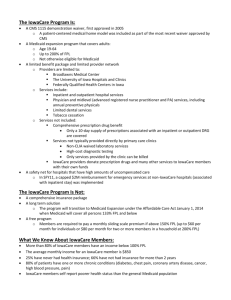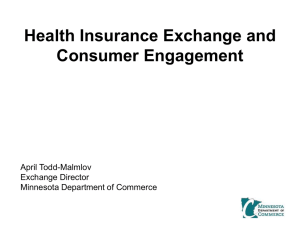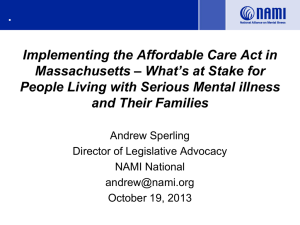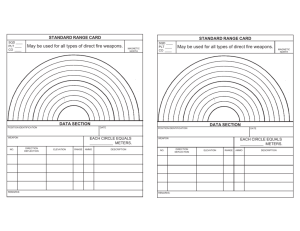Medicaid Reform Impact and Preparedness Bon Secours Health
advertisement
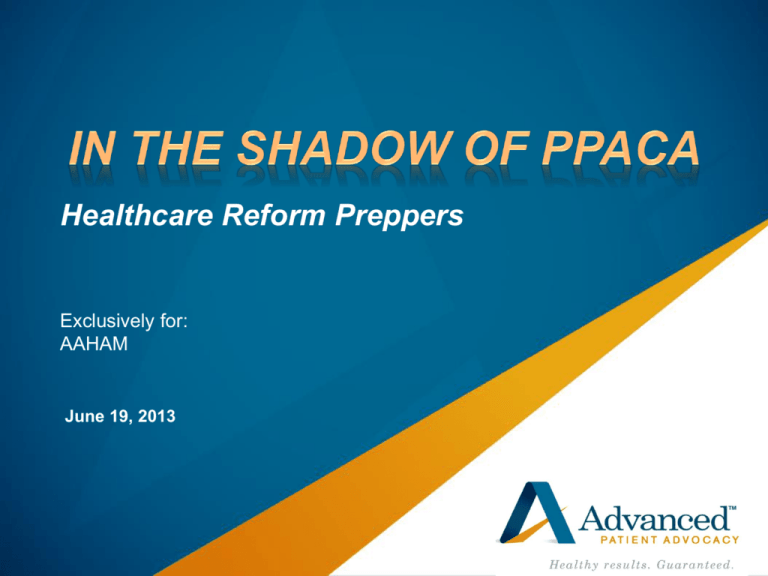
Healthcare Reform Preppers Exclusively for: AAHAM June 19, 2013 • The Status of Reform • Understanding Today’s Enrollment Dilemma • The Preppers Enrollment Survival Kit 2 © 2012 Advanced Patient Advocacy Today’s Outline 3 • Uncompensated care & bad debt increasing • Unmotivated patients who only seek enrollment when acute care is needed • Patients who struggle with the complex processes and bureaucracy • Patients who fail to maintain enrollment (churning) • Reimbursement challenges • Understanding resources & getting patients connected • States limiting/reducing dedicated resources • Audits & take backs © 2012 Advanced Patient Advocacy Providers are Challenged Why did we need reform? A changing population with changing healthcare needs 4 Congressional Goals with the new Healthcare Law For a more detailed version of this chart outlining major ACA provisions, see APHA’s “Affordable Care Act Overview,” available at http://www.apha.org/advocacy/Health+Reform/ACAbasics/. 5 PPACA Medicaid / Insurance Reform Medicaid Expansion Insurance Exchanges 6 Insurance Reform Carriers MAY NOT: Carriers MUST: • • Cover “essential health benefits” • Cover preventive services with no co-pays or deductibles • Cover young adults on their parents’ plan through age 26 • Spend more on services, less on profits (MLR) • Justify double-digit rate increases (rate review) • Deny or limit coverage for pre-existing conditions Rescind coverage over simple paperwork mistakes • Set lifetime caps on essential coverage • Charge women more than men (gender rating) More information: Healthcare.gov: Rights and Protections 7 (from the Affordable Care Act of 2010) Medicaid Reform • Simplify eligibility rules and reduce confusion • Streamline enrollment and eliminate barriers • Minimize lapses in coverage (churning) 8 Medicaid Expansion • More people are covered • Expand Federal Match (FMAP) to help states finance coverage expansion. © 2012 Advanced Patient Advocacy Medicaid Key Elements Medicaid Expansion Categorical group U.S. minimum threshold preACA, 2009* Children 0-5 133% FPL Children 6-19 100% FPL State thresholds, 2009: medians , (ranges) 235% FPL (133-300% FPL) 235% FPL (100-300% FPL) 185% FPL Pregnant women 133% FPL Working parents State's July 1996 AFDC eligibility level^ 64% FPL Non-working parents State's July 1996 AFDC eligibility level^ 38% FPL Childless adults Eligibility not mandated. State must apply for waiver to cover this 0% FPL (0% FPL in 46 states; 100160% FPL in 5 states) Elderly, blind, disabled Receipt of SSI^ (133-300% FPL) (17-200% FPL) (11-200% FPL) 75% FPL (65-133% FPL) Sources: Kaiser Family Foundation 9 U.S. minimum thresholds under ACA, 2014** 133% FPL 133% FPL (note traditional vs new) 133% FPL 133% FPL (note traditional vs new) A new eligible group: all adults not already eligible. The ACA expands the minimum income eligibility threshold to 133 percent FPL (effectively 138 percent FPL) for everyone except the elderly and disabled. This is a floor, not a ceiling: if states already had higher thresholds for certain populations, or want to set higher thresholds, that's fine. Under the ACA expansion, the categorical definitions shown in the table to the right will be less relevant than the difference between "traditionally eligible" and "newly eligible" persons. • Those in any population who were already eligible in their state (whether or not they were already enrolled) can be thought of as "traditionally eligible." They will continue to receive the services to which they are already entitled, and states will continue to receive their standard federal contribution for covering them, whether they enroll before or after 2014. • Those in any population who were not previously eligible but become eligible under ACA (which will include nearly all childless adults, plus many parents a nd some children depending on states' current thresholds) can be thought of as "newly eligible." 133% FPL (note traditional vs new) 133% FPL (note traditional vs new) Receipt of SSI Premium and Cost Sharing Limits for Individuals up to 400% of Poverty Under Health Reform Income (% FPL) Coverage Premium & Cost Sharing < 138% FPL Medicaid No Premium Cost sharing limited to nominal amounts for most services 139% - 250% FPL Exchange Sliding scale tax credits limit premium costs to 3 – 8.05% of income Sliding scale cost-sharing credits 251% - 400% FPL Exchange Sliding scale tax credits limit premium costs to 8.05 - 9.5% of income No Cost sharing credits Notes: Exchange coverage and tax credits are limited to lawfully residing individuals who do not have access to employer‐sponsored insurance. Lawfully residing individuals who are barred from enrolling in Medicaid during their first five years in the U.S. may receive Exchange coverage and tax credits. Premium credits will adjust annually. Source: “Summary of New Health Reform Law”, Focus on Health Reform, the Kaiser Family Foundation, June 18, 2010. 10 © 2012 Advanced Patient Advocacy Filing the Gap with the Insurance Exchange ACA predicted to cut uninsured rate Source: KFF: The Uninsured: A Primer (2012); 11 Red = not expanding Sources: KFF: The Uninsured: A Primer (2012); Advisory Board Company: Where the States Stand 12 13 14 What a mess can somebody help me? • Yes, No and maybe • Navigator and In Person Assistance Programs (IPAs) – In Person Assisters – guide/direct/facilitate a connection to the navigator or broker – Navigators – focus on the physical mechanics of enrolling – SHOP Navigators – focus on group market and act more as a broker 15 Who has the most to lose if consumers are not enrolled in the healthcare coverage that best meets their needs? • Federal Government • State Government • Insurance Carriers • Providers 16 © 2012 Advanced Patient Advocacy Here is the Dilemma How Can Providers Prepare? 17 18 © 2012 Advanced Patient Advocacy Tools Providers Need in Their Survival Kit Understand your State’s decisions • And the position of other States Charity policy updates • How will exchanges affect current charity write-offs? • Adjust policies to be in line with NEW Medicaid guidelines. What changes are needed in the registration process? • New verification procedures (New Technologies) • Are you asking THE RIGHT questions? • Assistance strategies for those uninsured or with life changes? © 2012 Advanced Patient Advocacy Update Policies & Procedures Registration tools The Registration team is the front line, do they have the tools they need to correctly classify/route patients? Be careful not to over rely on technology solutions? 20 Getting It Right The First Time • A 64 year old male patient arrives in your Emergency Department after an accident. • What primary I-plan do you select at discharge? – Common Answers: Self-pay, Commercial, MVA or Medicare • How does that selection affect the way the account tracks in your system and future business office actions? • What questions do you need to ask to ensure this patient is categorized correctly? 21 Building an Enrollment Strategy • Target • Broaden • Maximize • Take advantage of the Disability Opportunity 22 • Avoid the collection agency approach • Use technology to create efficiencies not short cut the screening process • All claims are not created equal • Use automation to identify opportunity • Stratify work segments to improve efficiency 23 © 2012 Advanced Patient Advocacy Segment & Target Population(s) Do you know the categorical breakdown of your patient population? • Once you understand your patient mix then you can target the populations most likely to qualify for assistance programs • Focus resources and customize the enrollment strategy • Develop an outpatient strategy that delivers enrollment assistance at the time and place eligible patients access services Categorical Patient Mix Inpatient Outpatient/ED © 2012 Advanced Patient Advocacy Not All Uninsured Patients are Created Equal ED Case Study This facility previously worked with an ED screening & enrollment process that focused on post-discharge contact. A 12 month evaluation period was established to man the ED from 10 am – 10 pm and they experienced the follow: Results • 56% increase in the number of Medicaid approvals • Increase converted charges by $1.1 m annually • At a reimbursement rate of 16%, approximately $176,000 cash annually • Increased staffing by adding 2 FTEs and other cost of $125,000 • Return visit rate of 4 times annually on average (future charges of $4.4 m covered) with annual reimbursement estimated at $500,000 © 2012 Advanced Patient Advocacy Point-of-Service Modeling STRATEGY: Initial contact during inpatient visit or at the time of care is not enough, a strong follow-up program is essential. • Over-reliance on the patients word and diligence (no contact with patients attorney, etc.) • Set standard abbreviations and ensure all team members consistently document activity • Establish a post discharge follow-up program that includes outreach and ensures filing deadlines are met • Eligibility verification process that is consistent and strategic Recommend using an account management process, software or tool. This would ensure patients are not falling into gaps, increase conversions and help with performance measurement . © 2012 Advanced Patient Advocacy How far will you go? A broad enrollment solution will reduce your level of uncompensated Care An effective enrollment program must be more than just Medicaid! • Social Security Disability Insurance • Veterans Benefits • Supplemental Security Income • Indian Health • COBRA • SCHIP • Pre-existing condition coverage • Immigrant programs • New Minor & Adult groups for Medicaid • Liability (MVA & WC) • Insurance Exchange Opportunities Payments resulting from enrollment by Payer NonMedicaid 23% Total Charges Resolved by Payer Disability 20% Medicaid 77% NonMedicaid 30% Medicaid 50% © 2012 Advanced Patient Advocacy Are You Getting the Maximum Return on Your Enrollment Solution Investment? Expand Screening and Enrollment • More than just Medicaid • SSI is not enough • Extended benefit opportunities (COBRA, ERRP) 64 Fed. Reg. 5160, 5170 28 • Pre-existing and high-risk coverage • Liability and Workers Compensation © 2012 Advanced Patient Advocacy Connect to the right Payer Case Study: Maximized Reimbursement Originally classified as Medicare: • Six-year-old girl falls on grandmother’s property • Ambulance visit to local ED • Injuries comprised of joint pain (shoulder, hip, lower extremities); contusions $ 624.00 - Professional Charges $ 2,847.95 - Institutional Charges $ 3,471.95 - Total Charges $ 2,151.01 - Adjustment $ $ $ 616.97 - Medicare Payment 76.97 - Other Payment 693.94 - Total Payments 20% 29 Percentage Paid Case reclassified as liability: • Interview with grandmother showed active claim opened with her homeowner’s policy • APA negotiated with adjuster • $5k available MedPay provision • APA advised refund Medicaid $ 624.00 - Professional Charges $ 2,847.95 - Institutional Charges $ 3,471.95 - Total Charges $ $ (616.97) - Medicare Refund (76.97) - Other Refund $ 3,471.95 - Liability Payment 100% Percentage Paid Go Broader Strategy: Assist patient’s with programs outside of traditional Medicaid. • Leverage existing programs like SCHIP • Higher reimbursement opportunities and better coverage programs like PCIP, COBRA, Disability, Crime Victims, MVA, etc. The math behind expanding your enrollment program in the ED or other outpatient points of access? • Staffing cost • Low reimbursement rates • Future utilization rates (three to five times ED use per year) Go Deeper What enrollment opportunities exist for this patient? Scenerio: • Patient is 57 years old • Entered the ED for the flu • Presented with Anthem Blue Cross • Currently not working due to side effects of dialysis Strategy: 31 • Use trending • Data scrubs • Registration Staff Training The Disabled Patient Gap • In a recent APA study we found that of the patients admitted to the hospital with a medical condition that would qualify as disabled under SSDI/SSI 80% presented with commercial insurance • Six months later, only 20% of that patient group had claims that were paid by commercial insurance and more than 63% were classified as bad debt, self pay or charity as a final disposition What do we know about disabled patients? • They are frequent utilizers of healthcare service • When they use services their services are usually high balance services • They frequently max out benefits for private insurance coverage • Less than 3 out of every 10 people who apply for Social Security are approved • 65% of Social Security approved disabled patients are dual eligible Disabled Patient Utilization © 2012 Advanced Patient Advocacy One out of every ten (12.6%) working age Americans(ages 21-64) has a DISABILITY SSA Case Study This study measured the impact Bon Secours Health System in Richmond, VA experienced as a result of a focused disability program and the use of electronic medical records transfer directly to SSA for disability determination. Results • 42% improvement in the processing time of disability applications • $2.1 million in additional revenue recovered that was previously classified as uncompensated care * as reported in “Using the Nationwide Health Information Network to Deliver Value to Disability Claimants: A Case Study of Social Security Administration and MedVirginia Use of MEGAHIT for Disability Determination.” 33 © 2012 Advanced Patient Advocacy Impact of Focused Disability Enrollment a Program Strategy: Focus on disabling diagnosis and consider patients entire situation. Do not rely on the patient to achieve success. • Be proactive – Patients are high utilizers of hospital services – Compassionate allowance cases – Data scrubbing and trending • Accelerate disability process • Maximize Disproportionate Share reimbursement © 2012 Advanced Patient Advocacy The Disability Opportunity Streamline • Processes (eliminate redundancies) – Within in your enrollment process – Between the facility and the state/county – With the patient and your process • Communication – make sure everyone who needs to know has access to the information – Create system-wide communication strategies • Partnerships (look beyond the hospital walls) – leverage the resources others in the community have available for patients 35 It’s Decision Time What role will your hospital play? (officially or unofficially) In an article published by Kaiser Family in October 2010 they state: “In addition to the(se) systems safeguards, as well as essential due process protections, states should maintain community-based enrollment assistance as an integral piece of the enrollment system. Consumer and community organizations and providers can be partners in helping to identify and address enrollment problems and facilitate enrollment and renewal for individuals unable to manage self-service options.” 36 What are my choices? 1. Let the State & Federal Governments handle enrollment 2. Continue to provide enrollment assistance at my current level of involvement 3. 37 Become the patients resource for all enrollment avenues © 2012 Advanced Patient Advocacy Choosing the Provider Role Choosing the Provider Role Educate, Navigate & Connect • Providers will find themselves in a unique position • Consumer/Patients will struggle to understand options • Insurance exchanges will provide new guidance Educated consumers connected to insurance programs that best meet their financial and healthcare needs will yield the greatest reimbursement to providers. 38 Funding Opportunities Watch for Funding Opportunities & Apply • Grants.gov • HHS Grants Forecast Community Transformation Grants Investments in (and dissemination of) evidence-based and practice-based community strategies and programs Focusing on Priorities for Healthier Living: • tobacco-free lifestyles • active living and healthy eating • high-impact quality clinical and other preventive services • creation of healthy and safe physical environments Run by CDC, funded by Prevention Fund • $145M in FY 2011, $226M in FY 2012 More information: http://www.cdc.gov/communitytransformation/ • What extremes the political parties will go to make a statement? • The timing and outcome of legal challenges? • What will be the impact on commercial and employer based insurance coverage? • Where the funds to pay for the program will really come from? • How all the details will come together: Exchanges, ACOs, Individual Mandate, and the impact on both small and large businesses? 41 © 2012 Advanced Patient Advocacy Still So Much We Don’t Know Segment • Customized enrollment programs for different patient groups • Use technology to expand opportunities not limit them Partner & Expand • Build relationships in the community that can increase the number of insured patients • Take a broad approach beyond traditional Medicaid & SSI • Expand communication and share information system wide. Educate, Navigate & Connect • Ensure your patients are knowledgeable about their options • Mitigate financial risk by connecting patients to programs with better reimbursement • Become the resource for coverage information 42 © 2012 Advanced Patient Advocacy The Moral of the Story! Thank You Michael D. Wilmoth, Esq. mwilmoth@apallc.com (703) 403-3521 www.aparesults.com 43 Important Sources J. Angeles, Explaining Health Reform: The New Rules for Determining Income Under Medicaid in 2014, The Henry J. Kaiser Family Foundation, Kaiser Commission on Medicaid and the Uninsured, 06-02-2011, http://kff.org/healthreform/8194.cfm P.. F. Short, K. Swartz, N. Uberoi et al., Realizing Health Reform’s Potential: Maintaining Coverage, Affordability, and Shared Responsibility When Income and Employment Change, The Commonwealth Fund, May 2011, http://www.commonwealthfund.org/~/media/Files/Publications/Issue%20Brief/2011/May/1503_Short_m aintaining_coverage_affordability_reform_brief.pdf S. Dorn, Implementing National Health Reform: A Five-Part Strategy for Reaching the Eligible Uninsured, Robert Wood Johnson Foundation, Urban Institute, May 2011, http://www.rwjf.org/files/research/72371urban201105.pdf S. Dorn, The Basic Health Program Option under Federal Health Reform: Issues for Consumers and States, Robert Wood Johnson Foundation, State Coverage Initiatives, May 2011, http://www.statecoverage.org/node/2918 Medicaid Program; Eligibility Changes under the Affordable Care Act of 2010, 42 CFR Parts 431, 433, 435, and 457, [CMS-2349-P], RIN 0938-AQ62, Centers for Medicare and Medicaid Services (CMS), HHS, August 12, 2011, http://www.ofr.gov/OFRUpload/OFRData/2011-20756_PI.pdf. 44 More Important Resources apha.org/advocacy/reports Healthcare.gov (U.S. Dept. of Health and Human Services) State Refor(u)m (National Academy for State Health Policy) Health Reform Source (Kaiser Family Foundation) Health reform summary; Implementation timeline; ACA federal funds tracker; Statehealthfacts.org Health Reform Central (Families USA) Health Insurance 101 (Community Catalyst and Georgetown University) Enroll America Center for Medicare and Medicaid Innovation Federal Register: Health Care Reform 45
